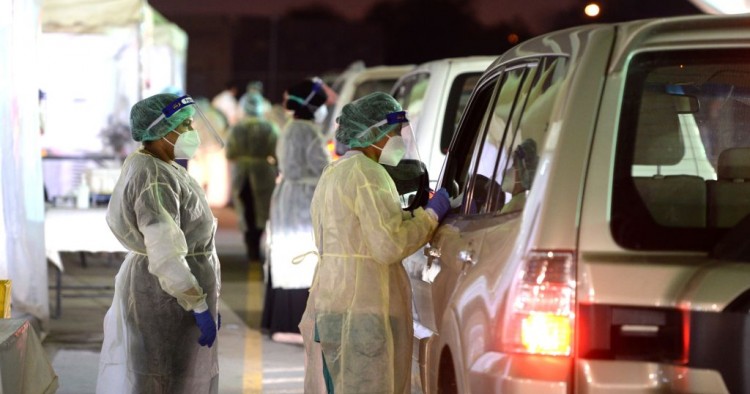Contents:
- Pandemic, economic contraction, and geopolitical shifts
- Another horrible year for Iran
- A year of mounting challenges for Iraq
- The GCC states turn inward, overshadowing a changing of the guard
- Turkey: Foreign policy hardball, with little to show for it
- Libyans pulled back from conflict but still seek deals on leadership
- The Palestinians in 2020: From bad to worse
- Afghanistan in 2020: A year of hope, frustration, and suffering
- A mixed year for Egypt
- Israel: A year of political and economic uncertainty
- Pakistani struggles in 2020
- Syria in 2020: Civilians suffer the most
- Algeria begins and ends 2020 in stalemate
Pandemic, economic contraction, and geopolitical shifts
Paul Salem
President
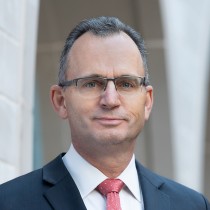
2020 in the Middle East was marked by the COVID-19 pandemic, the deep socio-economic toll it is taking, and the regional shifts brought about by the normalization of relations between Israel and a number of Arab states.
The pandemic hit Iran and Turkey early, followed by Iraq and some of the Gulf states, but quickly spread throughout the region. Exact infection and mortality rates are hard to generalize, as many Middle Eastern countries undercount, but the pandemic is causing health crises throughout the region. Many states were proactive in putting health and lockdown provisions in place, attempting to limit the damage. Like much of the world, the region is bracing for a difficult winter season, with states trying to line up acquisition and distribution of vaccines during 2021.
At the economic level, the region’s economies contracted by an average of around 5 percent, driving tens of millions into poverty, and millions into unemployment. The economic blow was the result of several factors: the slowdown of domestic economic activity because of lockdowns; the slowing of global demand; the particular blow to certain pandemic-sensitive sectors like tourism; and the collapse of oil prices. 2020 is the worst year economically in the past half-century, and the high levels of unemployment and poverty that prevailed before 2020 will be worse in 2021. Most governments have worked hard to manage the crisis, but with limited fiscal space, the pain has been widespread and unavoidable.
Conflict areas, such as those in Yemen, Syria, and Libya, have been particularly hard hit. Economic contraction there is estimated at around 13 percent, with no government or state institutions available to manage the crisis or ease the pain.
Geopolitically, the year will likely be remembered for the breakthrough agreements between Israel and several Arab states. With Morocco, Egypt, Sudan, Jordan, and Saudi Arabia’s partners — the UAE and Bahrain — now having normalized relations with Israel, the old alignments and assumptions that defined the region for decades are deeply in flux. The agreements have immediate consequences for the U.S., whose partners are now working together; for Iran, whose enemies are now working together; for the Palestinians, who have been left high and dry by the agreements; and for the Western Sahara conflict.
Iran has had a particularly rough year, not only because of the pandemic and its consequences, but also because of the “maximum pressure” campaign by the Trump administration and the assassination of two of its top leaders: Gen. Qassem Soleimani, who built and presided over its proxy forces around the Middle East, and Gen. Mohsen Fakhrizadeh, who led its nuclear program.
The region, and much of the world, ended the year looking to the fraught presidential election in the U.S., and pondering how a Biden administration would impact U.S. foreign policy.
@paul_salem
Another horrible year for Iran
Alex Vatanka
Director of Iran Program and Senior Fellow, Frontier Europe Initiative

The year 2020 was another annus horribilis for the Islamic Republic. On the foreign policy front, the Trump administration’s “maximum pressure” campaign proved relentless. Even as Tehran took steps to tough it out, the combined cost of the American-led sanctions and an unresponsive political posture to public demands for change kept Iran on the edge of popular unrest throughout the year. Meanwhile, as with the rest of the world, the COVID-19 pandemic hit Iran hard, but the situation was exacerbated due to sanctions. Domestic production and consumption and an increase in barter-type trade with neighboring states were meant to help Tehran circumvent U.S. sanctions, but the pandemic put a big damper on such hopes. While Tehran at first judged the pandemic as an opportunity to foster international sympathy to undermine the U.S. sanctions regime, the continued adherence of countries and companies around the world to American demands not to deal with Iran was another wakeup call for Tehran about its isolated and precarious foreign policy position.
As far as the power structure in the Islamic Republic is concerned, worries about the health of 81-year-old Supreme Leader Ali Khamenei were another source of anxiety in the ranks of the regime. The pandemic meant that Khamenei only had a few public events or meetings with officials. The supreme leader is, after all, the epicenter of the regime and a fraying command-and-control structure would not only have implications inside Iran but also in the wider region as the U.S. and Iran remain locked in a standoff. To dispense with any doubts and reduce the risk of an accidental war with the Americans, Khamenei reportedly told senior Revolutionary Guards commanders not to retaliate against Israel in Syria. Khamenei believes Iranian retaliation could spill over into a broader war, a scenario that might jeopardize his succession plans in Tehran.
Most notably, Khamenei signaled repeatedly throughout 2020 that he wants someone from the ranks of the hardliners to secure the presidency in the June 2021 elections. Compared to the Office of the Supreme Leader, the Presidential Palace is powerless, but who occupies the presidency still has symbolic value. And when a growing list of individuals with links to the Revolutionary Guards pushed for the next president to be a no-nonsense marshal who can deal with the multiple crises affecting the country, Khamenei’s silence was interpreted as a blessing of such calls. The intra-regime fight for policy domination should not be exaggerated, but 2020 had a number of telling moments to suggest the pendulum is about to swing even further toward the hardline camp in the year to come.
@AlexVatanka
A year of mounting challenges for Iraq
Randa Slim
Senior Fellow, Director of Conflict Resolution and Track II Dialogues program

2020 started with a big bang in Iraq: The killing of the commander of Iran’s Quds Force, Gen. Qassem Soleimani, and the deputy leader of the Iran-linked Iraqi Popular Mobilization Forces (PMF), Abu Mahdi al-Muhandis, on Iraqi territory. This was followed by a retaliatory Iranian missile strike against Iraqi bases housing U.S. soldiers, placing Iraq in the middle of a U.S.-Iranian military escalation — a situation it has long sought to avoid. The tit-for-tat escalation between the U.S. and Iran on Iraqi territory defined Iraq’s political and security dynamics throughout the year.
The public health and economic challenges imposed by COVID-19 hit Iraq hard. To date, the country has the second highest total number of infections and COVID-19-related deaths in the region. Tumbling oil prices and the global economic downturn have forced the government to borrow money to pay public sector salaries and cover essential food and medical imports. In October, Ali Allawi, the minister of finance, offered a white paper for economic reform to put Iraq back on the path of economic solvency. Yet despite the fact that the need for reform is urgent and existential for Iraq, endemic corruption and the vested interests of political and business elites make the prospects of enacting structural reforms slim to none at the end of 2020.
The coronavirus pandemic along with an ongoing campaign of assassinations and physical harassment targeting civil society activists challenged the ability of the protest movement to sustain its October 2019 momentum. Yet, the movement is not over. As new parliamentary elections are being planned for 2021, the question is whether and how the protest movement will leverage its achievements through electoral politics.
A new government was formed in May 2020 headed by Mustafa al-Kadhimi, former director of the Iraqi National Intelligence Service. Mr. al-Kadhimi promised that his “crisis cabinet” would deal with the health, security, and economic challenges facing Iraq. Seven months into his tenure, there has been little to no progress on all of these fronts. Similar to his predecessors, he tried early on to confront the Iran-linked Iraqi paramilitaries, only to back down shortly thereafter.
Baghdad-Erbil relations continued to be stuck in a never-ending cycle of improvement and deterioration. Relations are on the negative end of the spectrum at the moment as the Kurdistan Regional Government (KRG) is hit by a wave of protests in reaction to delayed public sector payments — a problem that authorities in Iraqi Kurdistan blame on Baghdad not sending the province its monthly share of the budget. In November, the Iraqi Council of Representatives passed a fiscal deficit law requiring the KRG to submit all of its oil- and non-oil revenues to Baghdad in return for its share of the federal budget.
In a short period of time, the U.S.-Iraq relationship went from the love fest showered upon PM al-Kadhimi and his large delegation during their visit to Washington in August, including a meeting with President Donald Trump, to Secretary of State Mike Pompeo threatening just a month later to close the U.S. embassy in Baghdad if Iraqi leaders failed to stop rocket attacks on U.S. diplomatic assets by Iranian-backed Iraqi militias. The main objective of the U.S.-Iraq strategic dialogue, which was launched in June and met again in August, was to establish a sustained bilateral relationship beyond just the military-to-military realm. With a new U.S. administration that seeks to do less and not more in the Middle East, including in Iraq, the future of the dialogue is in question.
@rmslim
The GCC states turn inward, overshadowing a changing of the guard
Gerald Feierstein
Senior Vice President

The GCC 2020 calendar was bookended by the passing of its two longest-serving leaders who were also anchors of regional stability and solidity. Oman’s Sultan Qaboos bin Said passed away in January and Kuwait’s Sheikh Sabah al-Ahmad passed from the scene in September. Although both had been in ill health, nevertheless their deaths sent shockwaves through their domestic political systems as well as the regional order.
In particular, few Omanis alive today could recall their country prior to the accession of Sultan Qaboos nearly 50 years earlier in 1970. To a large degree, Qaboos will be remembered as the author of Oman’s modern history. Despite some trepidation that the leadership transition might trigger internally- or externally-inspired disruption, it came off remarkably smoothly. Sultan Haitham was named the new ruler of Oman within hours of Sultan Qaboos’ passing, ending speculation about the potential complications of an opaque transition scheme that had been devised decades earlier.
Similarly, although Kuwaitis had long anticipated that Crown Prince Nawaf al-Ahmad would succeed his half-brother, uncertainty had surrounded the appointment of the next crown prince. But, once again, that speculation was quickly and seamlessly resolved with the appointment of Sheikh Mishal al-Ahmad, which was rapidly confirmed by Kuwait’s Parliament.
A third 2020 shock to the regional political system, although again broadly anticipated, was the defeat on Nov. 3 of Donald Trump in the U.S. presidential election. Trump’s unalloyed backing for the GCC hardliners and sympathy for their opposition both to Iran and to political Islam (if slightly less so for their hostility to fellow GCC member state Qatar), as well as his resistance to challenging partners’ domestic policies, had been a linchpin of regional policies in Riyadh, Abu Dhabi, and Manama. President-elect Joe Biden’s victory, and the likely return to office of many of the architects of U.S. Middle East policy in the Obama administration, triggered new fears in these GCC capitals that a renewed focus on dialogue with Iran would diminish U.S. support for their political and security needs.
While the three shocks to regional politics might have been expected to dominate Gulf conversations in a normal year, they were overshadowed in 2020 by the domestic and regional impacts of two more body blows: the fallout from the COVID-19 pandemic and the collapse of energy markets as a consequence of the pandemic’s global economic impact. Generally, all of the GCC states won broad public approval for the steps they took to combat the pandemic and have been able to restore a semblance of normalcy in their public affairs. But the pandemic has had serious and potentially long-lasting consequences for regional economies, including the rapid departure of hundreds of thousands of skilled and unskilled guest workers who may never return. These effects were exacerbated by the rapid collapse of world energy prices, further stressed in the spring by a poorly timed Saudi price war aimed at Russian (and possibly American) competitors. As energy income plunged, all of the Gulf governments were forced to address yawning budget shortfalls and the need for belt-tightening. By the end of the year, prices had stabilized amid signs that economic recovery was underway at least in Asia, but earnings were still at a level well below the breakeven point for Gulf budgets, clearly signaling that economic pain would persist at least into 2021.
@j_feierstein
Turkey: Foreign policy hardball, with little to show for it
Gonul Tol
Director of Turkey Program and Senior Fellow, Frontier Europe Initiative

2020 has been another tumultuous year for Turkey’s foreign policy. Ankara’s regional policy has emphasized military action at the expense of diplomacy, but President Recep Tayyip Erdogan’s hardball tactics have yielded little in the way of results other than burnishing his “tough guy” image at home.
The year started with Erdogan’s announcement that Turkey would send troops to Libya to shore up the internationally recognized government in Tripoli. Erdogan threatened that Turkey would “teach a lesson” to Khalifa Hifter’s eastern Libyan forces if they did not stop their attacks against the Tripoli-based government. His announcement came after Turkey and Libya signed an agreement covering military cooperation and maritime boundaries in November 2019 as part of Ankara’s efforts to change the anti-Turkey status quo in the eastern Mediterranean led by Greece and Cyprus. Turkey’s move was condemned by several countries, including the U.S., Egypt, Israel, Greece, and Cyprus, and Turkey drew further criticism when it transferred thousands of Syrian mercenaries to fight in Libya.
In February, Turkey-Russia tensions in Syria came to a head when 33 Turkish forces were killed in an apparent Russian airstrike on the last rebel-held Syrian enclave of Idlib. Russia, which has been critical of Turkey’s failure to cleanse the enclave of jihadist forces, later said that Turkish troops were attacked while operating alongside jihadist fighters.
Energy exploration in the eastern Mediterranean, where Turkey and Greece have overlapping claims, has been a flashpoint as well. Ankara’s drilling for natural gas in waters where the ethnically-split Cyprus has economic rights rekindled tensions over regional energy reserves, and Turkey was once again the target of widespread condemnation. In solidarity with Greece and Cyprus, French President Emmanuel Macron urged Turkey to halt oil and gas exploration in disputed waters and deployed the French navy to the area. Soon afterwards, an American warship arrived at the Greek island of Crete to observe the escalating tension.
More recently, Turkey sent Syrian mercenaries to back Azerbaijan in its conflict with Armenia over the disputed region of Nagorno-Karabakh, drawing another round of condemnations from Europe, the U.S., and Russia.
Erdogan’s tough tactics might have played well at home, but they have done little to further Turkey’s national interests. On the contrary, they have only strengthened and broadened the anti-Turkey camp.
The U.S. Congress has hardened its approach vis-à-vis Turkey. A bipartisan group of lawmakers has been pushing hard to punish Turkey for Ankara’s purchase of the Russian S-400 missile defense system despite objections from NATO. Turkey already paid a heavy price for the decision. It was expelled from the U.S.-led F-35 program, costing Turkish defense firms billions of dollars. Under pressure from Congress, which recently passed a defense bill requiring President Donald Trump to impose sanctions on Turkey for its purchase of the S-400, Trump announced sanctions on Turkey’s defense procurement agency and four defense employees. The sanctions include a ban on all U.S. export licenses to the procurement agency and asset freezes and visa restrictions on the head of the agency as well as three other employees. The sanctions Trump picked out of 12 options available are not the worst group of sanctions — ones that could potentially have terrible implications for the country’s economy — but they will still complicate things for Turkey’s defense sector.
The move also follows a recent decision by EU countries to impose sanctions on Turkish officials and entities involved in gas drilling in Cypriot-claimed waters. They agreed that they would consider bigger and more punitive measures, such as trade tariffs or an arms embargo, after the new U.S. president is sworn in. Meanwhile, Saudi Arabia, which has been at loggerheads with Turkey since the 2011 Arab Spring over Ankara’s support for Islamist political groups, placed an informal boycott on Turkish goods.
The economic effects of these measures will be felt more deeply and widely in Turkey next year. The big question for Turkey in 2021 is: will Erdogan change course?
@gonultol
Libyans pulled back from conflict but still seek deals on leadership
Jonathan M. Winer
MEI Scholar
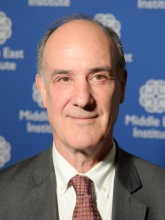
A year ago, Libyan warlord Khalifa Hifter, backed by Egypt, Russia, the UAE, and foreign mercenaries, was still trying to take Tripoli, overthrow the internationally-recognized Government of National Accord (GNA), and seize control of the country’s sovereign institutions and funds.
By late 2020, Libyans had moved to a better place — but it remained uncertain whether the U.N. political roadmap to late 2021 elections would become reality.
During 2020, Turkish deployments led to Hifter’s forced withdrawal from Libya’s west. Then, instead of escalating further, the foreign interveners pulled back from the brink, lowered the risk of regional war, enabling U.N.-organized negotiations to finally take place. By late October, a 5+5 Libyan Joint Military Commission agreed to withdraw all military units and armed groups from frontlines and to have all mercenaries and foreign fighters depart from Libyan territory by the end of January 2021.
A new U.N.-convened 75-member Libyan Political Dialogue Forum (LPDF) agreed on Nov. 15 to presidential and parliamentary elections to be held on Dec. 24, 2021, the 70th anniversary of Libya’s independence. Their agreed roadmap included the creation of a final one-year transition government under a new three-person Presidency Council to lead the transitional period toward elections, reunify state institutions, and provide security and basic services to the population until the elections are held.
As of mid-December, the process remained stalled over differences over who would wind up becoming Libya’s new leaders during the remainder of the transition, with no clarity on whether further progress was likely. Despite the 5+5 commitments, the warring sides continue to position themselves for possible future conflict, with reports of military cargo resupply from foreign sources by each side. Meanwhile, squabbling broke out involving Libya’s National Oil Corporation and the Central Bank of Libya over control and uses of Libyan oil revenues.
With military solutions to Libya’s problems no longer plausible, 2020 proved again that Libyan-to-Libyan agreements are hard to achieve, but nevertheless possible.
@jonathanmawiner
The Palestinians in 2020: From bad to worse
Khaled Elgindy
Senior Fellow, Director of Program on Palestine and Palestinian-Israeli Affairs
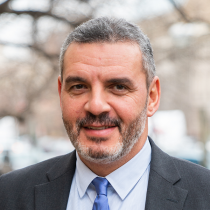
In 2020, an already bad situation became decidedly worse, as Palestinians in the occupied West Bank and Gaza Strip suffered one political and economic setback after another.
The release of the much-anticipated Trump Plan in late January confirmed the Palestinians’ worst fears. The centerpiece was a Palestinian “state” made up of disconnected fragments of West Bank territory surrounded and controlled by Israel. Israel would annex roughly 30 percent of the West Bank, including all of Jerusalem, the Jordan Valley, and all of the roughly 650,000 Israeli settlers living throughout the occupied West Bank, while retaining control over the putative Palestinian state’s borders, airspace, territorial waters, and electromagnetic sphere.
Despite the Palestinians’ rejection of the plan, the Trump administration and the Netanyahu government indicated that they would press ahead with it anyway. Inside Israel, release of the plan spurred talk of formal annexation, with a decision set for July 1. Meanwhile, to punish the Palestinians Trump successfully convinced the Arab Gulf states to withhold badly-needed assistance to the Palestinian Authority (PA).
The outbreak of the global COVID-19 pandemic in the spring devastated the already battered Palestinian economy, which was further compounded by Israel’s decision to withhold tax transfers collected on behalf of the PA that make up some two-thirds of its budget.
Events came to a head on May 19, when in response to the looming threat of Israeli annexation, Palestinian President Mahmoud Abbas declared an end to all signed agreements with Israel, including the once sacred pillar of PA-Israel security cooperation.
The announcements in August and September by the UAE and Bahrain, respectively, that they had agreed to fully normalize relations with Israel as part of the Trump administration-brokered Abraham Accords came as a further shock to both Palestinian leaders and the public, who condemned the deals as a betrayal of the Palestinian cause and a fatal blow to the Arab Peace Initiative.
Viewing the growing tide of Arab normalization with Israel as an existential threat to Palestinian national aspirations, Palestinian rival parties, Fatah and Hamas, along with other factions agreed to close ranks. As part of a reconciliation deal, Palestinian factions agreed to hold new presidential and legislative elections as well as elections for the Palestine National Council, the Palestine Liberation Organization's (PLO) long dormant parliament-in-exile. As with previous reconciliation efforts, however, the process soon stalled.
The death of longtime chief negotiator Saeb Erakat in November followed by the resignation of Hanan Ashrawi from the PLO Executive Committee a month later removed two of the PLO’s most experienced negotiators and underscored Abbas’ growing internal isolation. Meanwhile, as a goodwill gesture to the incoming Biden administration, and faced with the PA’s imminent financial ruin, Abbas’s leadership announced that the PA would resume all cooperation with Israel.
However, Trump’s electoral defeat in November seemed only to accelerate the administration’s scorched-earth policies. On Nov. 19, Secretary of State Mike Pompeo became the highest ranking U.S. diplomat to make an official visit to Israeli settlements in the occupied territories, using the opportunity to announce yet another radical shift in U.S. policy. Under new rules of origin guidelines, Israeli products originating in West Bank areas under sole Israeli control, known as “Area C,” would henceforth be labelled as “made in Israel,” effectively conferring U.S. recognition of Israeli sovereignty over some 60 percent of the West Bank. Closing out the Palestinians’ year of setbacks, on Dec. 10, Morocco became the fourth Arab country to formally normalize relations with Israel in as many months in return for U.S. recognition of Moroccan sovereignty over Western Sahara.
@elgindy_
Afghanistan in 2020: A year of hope, frustration, and suffering
Marvin G. Weinbaum
Director for Afghanistan and Pakistan Studies

Optimism is a rare commodity in Afghanistan. Yet early in 2020 hopes soared that a negotiated end to years of brutal civil war was in sight. Intra-Afghan peace talks were scheduled to begin in accordance with a Feb. 29 agreement reached between the U.S. and the Afghan Taliban that also called for the departure of American troops from Afghanistan and the Taliban’s cutting ties to al-Qaeda. The prospect of talks was greeted enthusiastically by the international community, and Qatar offered to host the Taliban and Afghan delegations for their formal deliberations. Polled in March, well over 80 percent of the Afghan people envisioned a successful peace process.
But getting formal talks off the ground proved difficult. In preliminary discussions the two sides wrangled over a series of issues, the most contentious of which was a provision of the bilateral agreement providing for prisoner exchange. It was not until mid-September that delegates actually sat down to negotiate, and it took three months more for them to agree fully on the procedures to govern the talks. The delegations were then expected to begin addressing the difficult substantive issues that would determine the form of a new Afghan government and the character of a future state. But the year ended with the talks in recess without their having agreed on a working agenda. A poll conducted in October found that almost half of those Afghans interviewed doubted that peace could be achieved within the next two years.
Politically, things had not gone any smoother over the year. Elections for the presidency of Afghanistan had taken place in September 2019, but not until this past May was there finally an agreement between President Ashraf Ghani and his chief adversary Abdullah Abdullah that settled the disputed election. Abdullah accepted the chairmanship of the peace council that would lead expected negotiations. Although government ministerial positions were slated to be equally divided between the two camps, it was not until late in the year that agreement was reached on the composition of a cabinet.
The year brought other misfortunes as well. During the spring, while the coronavirus was taking hold in neighboring Pakistan and Iran, Afghanistan seemed to be getting off lightly. Yet it was inevitable that with the accelerating return of long-term Afghan refugees from those two countries, the number of cases would rise. The greatest fear was that the poor health infrastructure in Afghanistan would limit the country’s ability to cope with the pandemic. Little comfort was taken from the continuing relatively low official numbers of recorded cases and deaths. With few testing facilities and labs, and unreliable reporting, the actual spread of the disease was believed to be seriously underestimated.
Probably the most disconcerting development during 2020 was the growing intensity of the war. Instead of a dropoff in violence with the peace talks getting underway, the incidences of deadly insurgent attacks across the country increased. The year closed out with rising frustrations over the peace process, heightened security concerns, and growing doubts about the political system.
@mgweinbaum
A mixed year for Egypt
Mirette F. Mabrouk
Senior Fellow, Director of Egypt program

2020 was a mixed bag for Egypt. It started off relatively well; Egypt was beginning to see the fruits of a comprehensive economic reform program backed by the IMF via a $12 billion loan in 2016. By the beginning of this year, the economy was growing at a very decent 5.6 percent. The budget deficit continued to fall, reaching 7.8 percent of GDP before the onset of the pandemic. Foreign reserves were up, remittances totaled $26.8 billion, tourism revenues tipped an all-time high of $13 billion, and Suez Canal revenues stood at $5.9 billion. Long considered an attractive emerging market economy, Egypt was again rated the most attractive country for foreign direct investment in Africa in 2019.
Even after the pandemic eviscerated the global economy, Egypt’s economy was the only one in the region projected to come through with a positive growth rate. And the government did move quickly, both in economic and social terms, to try to head off the worst of the fallout. On the economic front, the Central Bank announced an emergency rate cut of three percentage points. A new overnight deposit rate of 9.25 percent was instituted in March, along with an overnight lending rate of 10.25 percent, and a main refinancing operations rate of 9.75 percent. That same month the Central Bank instructed all banks to postpone any dues and payments on loans taken out by individuals and companies for the next six months. It also told banks to raise daily transaction limits on credit cards, canceling fees and commissions on POS and ATM withdrawals, and provide credit lines for companies to finance salaries and capital. Government social support programs were proceeding at a healthy clip; the cash transfer programs Takaful and Karama covered an extra million families, for a total of about 10 million individuals, helping to offset a rising poverty rate. In addition, the government completed a phenomenally successful national hepatitis C screening and treatment program.
However, the pandemic exposed inherent weaknesses that had been ignored for far too long, despite previous reminders. The same sectors of the economy that had helped fill the national coffers — tourism, remittances, and the Suez Canal — proved extremely vulnerable to external factors. Tourism alone lost almost $1 billion a month, according to the minister of tourism. Measures to combat contagion were complicated by the needs of a largely poor populace to earn a living. The informal class, which makes up a staggering 63 percent of the labor force, was especially hard hit and cash relief offered to laid-off laborers had a limited effect since they had to be registered online.
The same health sector that had achieved such success with the hepatitis campaign started to come apart at the seams under the strains imposed by the pandemic. Problems with inequitable access to health care provision were widely documented, with private hospitals charging hefty fees while public ones struggled to cope. The government wasted an opportunity to deal with long-held needs and grievances of the public system’s health care providers, coming down hard on those who questioned or denied the official line, alienating the very people it needed to help pull the country through the crisis.
On the international front, Egypt and Sudan were forced to attend one fruitless round of negotiations after another on the Grand Ethiopian Renaissance Dam. And while it needed international support, Egypt managed to endanger that support with its allies, as a result of its escalating human rights abuses, as security forces continued conflate dissent with sedition.
@mmabrouk
Israel: A year of political and economic uncertainty
Grace Wermenbol
Non-resident Scholar

2020 ends very much how it started for Israel. Bookended by political uncertainty, Israel is, once again, on course to hold parliamentary elections. In early December, the Knesset passed a preliminary bill to dissolve itself; if the further three readings prevail, Israelis would head to the polls for an unprecedented fourth election in the space of two years. In a last-ditch effort to force Prime Minister Benjamin Netanyahu to pass a government budget — and comply with the pre-arranged agreements of their emergency unity government — Defense Minister Benny Gantz offered his support for the bill.
Netanyahu is unlikely to honor the deal he made with Gantz in April amid a worsening economic and health crisis and following three inconclusive elections. The agreement saw Gantz, who had previously refused to enter into a government with Netanyahu, consent to forming an emergency unity government in return for the passing of a two-year national budget and a second-in-line rotation as premier. Netanyahu, who is on trial on charges of bribery, fraud, and breach of trust, does not want to face the court as anything other than prime minister — even at the cost of new elections and further economic uncertainty. Recent polls suggest that Netanyahu’s latest political gambit might not prove successful; surveys indicated that Netanyahu’s right-wing bloc, comprising Likud, Yamina, Shas, and United Torah Judaism, would fail to win a majority of 61 seats if elections were held.
One thing is certain: Israel’s fractured government will need to adapt to a new, downgraded ranking on the list of U.S. foreign policy priorities. In the aftermath of Joe Biden’s victory, Israelis are bracing for what they believe will be a downturn in relations with Washington; a post-election poll showed that 74 percent of Israelis believe that the new U.S. administration will be less friendly. Indeed, over the past four years, Donald Trump’s “America first” approach closely aligned with — and ascribed to — Israeli domestic and foreign policy objectives, while alienating and marginalizing the Palestinians. Transactional diplomacy does not favor the disenfranchised. While the Biden-Harris administration is unlikely to prioritize Israel or a new Israeli-Palestinian peace effort, the incoming administration is expected to return a modicum of credible U.S. mediation to the Israeli-Palestinian arena. In the meantime, Netanyahu is ready to capitalize on any quick wins that Trump’s waning tenure offers.
Pakistani struggles in 2020
Syed Mohammad Ali
Non-resident Scholar
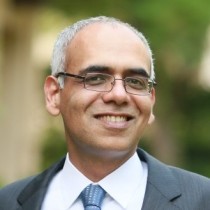
Halfway into his term in office, Prime Minister Imran Khan has not yet been able to bring the meaningful “change” for ordinary Pakistanis that he ran his election campaign on. Instead, Khan had to contend with another tumultuous year in office during 2020. His aggressive accountability campaign focused on hounding political opponents, instead of also going after the powerful establishment or the “electable” politicians who helped him gain power. His policy making style has been littered with inconsistencies, or “U-turns,” which show little capacity to progressively dismantle the elitism and inequalities plaguing the country.
To be fair to the ruling party, however, 2020 has hardly been kind to Pakistan. While spared from widespread infections, the already precarious economic situation of Pakistan has been worsened due to the COVID-19 pandemic. Khan’s government includes economic managers brought in from the same international institutions (like the IMF and World Bank) that he has been railing against for years, yet growth prospects remain elusive, and the country’s external debt keeps rising.
Pakistan’s protracted rivalry with India has shown no sign of easing. Under the constant scrutiny of the Financial Action Task Force’s “grey list,” Pakistan has not engaged in cross-border militancy. Yet aggressive moves by the Modi government, especially revocation of the special status of the disputed territory of Kashmir and introduction of discriminatory legislation against Indian Muslims, have not allowed any space to negotiate peace.
Pakistan has managed to bring the Taliban to the negotiating table with the U.S., but it lacks the leverage or wherewithal to secure an intra-Afghan resolution. The U.S. remains wary of Pakistan’s growing economic and military cooperation with China, and the civil-military imbalance in the country, but it has not helped matters due to America’s own growing embrace of India to counter China.
Whether the U.S. and Pakistan will be able to better manage their bilateral relations, work together to ease the domestic situation in Pakistan, and reduce regional tensions in South Asia under the new U.S. administration taking office in January 2021 remains to be seen.
Syria in 2020: Civilians suffer the most
Robert S. Ford
Senior Fellow

A Trump administration official told Congress on Dec. 9 that the enduring defeat of ISIS in Syria, the full withdrawal of Iranian forces from the country, and a political deal to resolve the underlying conflict is “within reach.” A November Pentagon report concluded that ISIS is severely diminished in eastern Syria, where it can no longer hold territory. By contrast, the American-backed Syrian Democratic Forces (SDF) can clear and hold any space in their territory east of the Euphrates. The Americans assigned control of eastern Syria’s small oilfields to the SDF while maintaining a no-fly zone there along with a small military presence to deter Russia and the Syrian government from seizing the oilfields. In response, Russian units occasionally harassed American patrols, leading the Americans to send reinforcements. Meanwhile, ISIS was stronger in central Syria and regularly ambushed pro-government forces west of the Euphrates. Washington had no answer for the ISIS threat there.
The Syrian government struggled in 2020 due to the sharp economic contraction caused by corruption, mismanagement, and Western sanctions. Syrians endured long lines to buy essentials like bread and fuel. In addition, the COVID-19 virus was rampant. Despite these pressures, Assad conceded nothing at U.N.-sponsored constitutional talks in Geneva that aim at introducing some reforms. Moreover, the Assad circle put down an internal challenge from Bashar al-Assad’s wealthy cousin Rami Makhlouf. In urgent need of foreign help, Damascus accepted the consolidation of Iranian militias near the Euphrates River, which in turn provoked regular Israeli airstrikes.
Heavy fighting in northeastern Syria in early 2020 between the Syrian army, backed by the Russian air force, and opposition fighters, backed by Turkey, finally ended with, as one Turkish analyst observed, the Syrian army “stopped but not repelled.” Notably, pro-government forces secured a crucial highway linking Damascus and Aleppo. Fighting in Idlib Province diminished for the rest of 2020 aside from occasional Russian and Syrian airstrikes. Turkey at year’s end was consolidating its military positions in the embattled province and the March 2020 cease-fire did not look permanent, nor was a solution apparent for the 3 million internally displaced civilians there.
While fighting has diminished in Syria, there is no political solution to the crisis on the horizon, and the suffering of Syrian citizens from shortages and flare-ups of fighting will continue.
@fordrs58
Algeria begins and ends 2020 in stalemate
Khaldoun Khelil
Non-resident Scholar
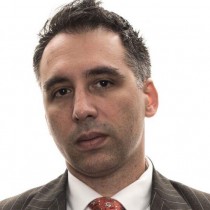
The massive national protests that dominated Algerian life throughout 2019 have mostly been quelled by the government in the wake of the COVID-19 pandemic. While the health emergency in the country is grave, with over 90,000 Algerians infected and at least 2,500 deaths, the Algerian government’s use of the crisis to quash protests and arrest activists will only widen the already-deep fissures in the North African country’s political landscape. Since the protests forced the resignation of long-time President Abdelaziz Bouteflika in early 2019, they were a constant presence on streets all over Algeria for more than a year until March 2020. The protests even continued after the uninspiring election of little-known civil servant Abdelmadjid Tebboune to the presidency — a position he secured because of his close ties to the former military chief, Gen. Ahmed Gaid Salah, who promptly passed away a few weeks after the election. This left President Tebboune without any clear backer among the shadowy powerbrokers and military generals known colloquially as le pouvoir. Tebboune’s cabinet reshuffles in early 2020 were likely an attempt to secure his position.
Despite the respite from protests provided by the pandemic in 2020, the Tebboune regime has yet to find its footing or legitimacy among the people, who seem unwilling to compromise with anyone associated with the Bouteflika years. Turnout for his election was estimated to have been less than 40 percent and was likely much lower. This stalemate has been almost comically exacerbated by Tebboune’s own infection with a severe case of COVID-19 and his complete disappearance for over two months while he was treated without any transparency or meaningful media coverage — a throwback to the many times his predecessor received urgent medical care in complete secrecy.
Although the country faces many serious challenges, the Algerian government has focused on limiting dissent as its most pressing concern. President Tebboune signed new legislation against so-called “fake” news and several prominent activists and journalists have already been prosecuted under the new restrictions. Coupled with restricted access to several independent news sites, Algeria has seized on the pandemic as a means to curtail political dissent. To be sure the popular protest movement known as the Hirak is a serious challenge to Algeria’s leadership, particularly the military, which controls almost all levers of power in the country. Perhaps if Algeria had diversified its economy during the boom years, its current leadership would have fewer detractors and its fortunes would be less tied to the price of oil. But with oil revenues stalled and likely to remain so for the near future, the Algerian regime has few options available to regain its legitimacy or authority.
Photo by Asad/Xinhua via Getty
The Middle East Institute (MEI) is an independent, non-partisan, non-for-profit, educational organization. It does not engage in advocacy and its scholars’ opinions are their own. MEI welcomes financial donations, but retains sole editorial control over its work and its publications reflect only the authors’ views. For a listing of MEI donors, please click here.













